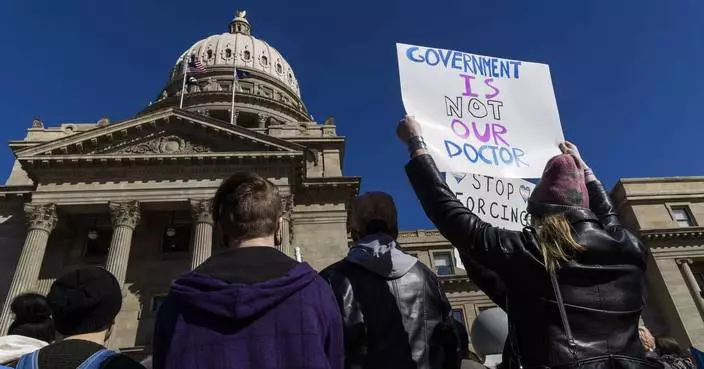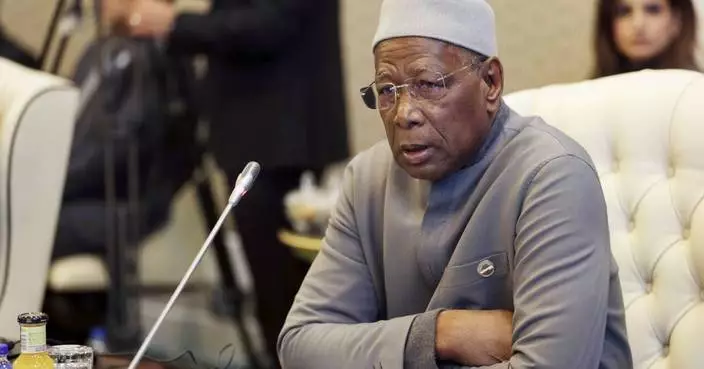Libyan officials said Saturday that the leader of the U.N.-supported government would not support a deal with his primary rival in the country's civil war to lift a months-long blockade on its vital oil trade.
According to an official at his office, Prime Minister Fayez Sarraj opposed the final deal struck with commander Khalifa Hifter, whose east-based forces led a failed year-long siege to take the capital, Tripoli, from the U.N.-backed government.
“The prime minister did not give his approval to the final version of the deal,” the official told The Associated Press, speaking on condition of anonymity.
Hifter said in a televised address Friday that his forces would allow the Libyan oil facilities to start operating again for the first time since January “with conditions that ensure a fair distribution of revenue.”
The deal to start pumping Libyan oil again appeared to have been spearheaded by the deputy prime minister, Ahmed Matiq, and emerged days after Sarraj said he planned to hand over power by the end of October to a new administration in Tripoli.
Matiq struck an agreement to distribute the country’s petrodollars more equitably between its warring sides, according to Ahmed al-Mosmari, the spokesman of Hifter’s self-styled Libyan Arab Armed Forces.
The deal between Matiq and Hifter's representatives did not address the scores of Russian mercenaries from Wagner, a Kremlin-linked private security company, stationed across oil fields that the National Oil Corporation says remain a barrier to the resumption of exports.
“Matiq surrendered very loose, very generous concessions to the LAAF, especially in the realm of banking and finance,” said Jalel Harchaoui, a Libya expert at The Netherlands Institute of International Relations.
Harchaoui said the oil deal was already helping to “revitalize" Hifter after months of military setbacks that followed Turkey's military intervention supporting forces loyal to the Tripoli government.
Matiq largely negotiated the deal behind closed doors with Hifter’s son, Khalid, and its final shape took many Libyan leaders by surprise. Matiq and Hifter’s son met earlier this month in Russia, a key supporter of Hifter.
Osama al-Juwaili, a military leader with Tripoli-allied forces, called the agreement a “farce" in televised comments. He urged Sarraj to announce his total position to the deal.
Gomaa al-Gamaty, Sarraj’s envoy to the Maghreb countries, tweeted that the deal is likely to fail since the prime minister, national oil company and the Central Bank in Tripoli were not part of it.
Mustafa Sanallah, the NOC’s chairman, rejected what he called “secret” and “disorganized negotiations” aiming to undercut an internationally-brokered political process to reopen the oil fields.
He said the corporation would not lift force majeure, a legal maneuver that lets a company get out of its contracts because of extraordinary circumstances, until Russian mercenaries, fighting alongside Hifter, leave the oil fields and export terminals.
Libya’s highly prized, light crude has long been a factor in its civil war, as rival militias and foreign powers jostle for control of Africa’s largest oil reserves.
Powerful eastern tribes loyal to Hifter first seized control of the oil fields in January, cutting Libya’s 1.2 million barrels a day to a trickle and starving the country of badly needed cash, to protest what they said were the inequitable distribution of revenues.
Libya was plunged into chaos when a NATO-backed uprising in 2011 toppled and killed longtime ruler Moammar Gadhafi. The country has since split between rival east- and west-based administrations, each backed by armed groups and foreign governments.
The blockade has deprived the Tripoli-based National Oil Corporation of nearly $10 billion in revenue and led to nationwide fuel shortages.
BEIRUT (AP) — Leaked photographs of the son of Libya’s late dictator Moammar Gadhafi and the tiny underground cell where he has been held for years in Lebanon have raised concerns in the north African nation as Libyan authorities demand improvements.
The photos showed a room without natural light packed with Hannibal Gadhafi’s belongings, a bed and a tiny toilet. “I live in misery,” local Al-Jadeed TV quoted the detainee as saying in a Saturday evening broadcast, adding that he is a political prisoner in a case he has no information about.
Two Lebanese judicial officials confirmed to The Associated Press on Monday that the photographs aired by Al-Jadeed are of Gadhafi and the cell where he has been held for years at police headquarters in Beirut. Gadhafi appeared healthy, with a light beard and glasses.
A person who is usually in contact with Gadhafi, a Libyan citizen, said the photos were taken in recent days. All spoke on condition of anonymity because they were not authorized to speak to media outlets.
Gadhafi has been held in Lebanon since 2015 after he was kidnapped from neighboring Syria, where he had been living as a political refugee. He was abducted by Lebanese militants demanding information about the fate of prominent Lebanese Shiite cleric Moussa al-Sadr, who went missing during a trip to Libya in 1978.
The fate of al-Sadr has been a sore point in Lebanon. His family believes he may still be alive in a Libyan prison, though most Lebanese presume al-Sadr, who would be 95 now, is dead.
A Libyan delegation visited Beirut in January to reopen talks with Lebanese officials on the fate of al-Sadr and the release of Gadhafi. The talks were aimed at reactivating a dormant agreement between Lebanon and Libya, struck in 2014, for cooperation in the probe of al-Sadr. The delegation did not return to Beirut as planned.
The leaks by Al-Jadeed came after reports that Gadhafi was receiving special treatment at police headquarters and that he had cosmetic surgeries including hair transplants and teeth improvements. Al-Jadeed quoted him as saying: “Let them take my hair and teeth and give me my freedom.”
Gadhafi went on a hunger strike in June last year and was taken to a hospital after his health deteriorated.
Libya’s Justice Ministry in a statement Sunday said Gadhafi is being deprived of his rights guaranteed by law. It called on Lebanese authorities to improve his living conditions to one that “preserves his dignity," adding that Lebanese authorities should formally inform the ministry of the improvements. It also said Gadhafi deserves to be released.
After he was kidnapped in 2015, Lebanese authorities freed him but then detained him, accusing him of concealing information about al-Sadr’s disappearance.
Al-Sadr was the founder of the Amal group, a Shiite militia that fought in Lebanon’s 1975-90 civil war and later became a political party that is currently led by the country’s Parliament Speaker Nabih Berri.
Many of al-Sadr’s followers are convinced that Moammar Gadhafi ordered al-Sadr killed in a dispute over Libyan payments to Lebanese militias. Libya has maintained that the cleric, along with two traveling companions, left Tripoli in 1978 on a flight to Rome.
Human Rights Watch issued a statement in January calling for Gadhafi’s release. The rights group noted that Gadhafi was only 2 years old at the time of al-Sadr’s disappearance and held no senior position in Libya as an adult.

FILE - In this undated file photo made available Sept. 25, 2011, Hannibal Gadhafi, son of ousted Libyan leader Moammar Gadhafi, watches an elite military unit exercise in Zlitan, Libya. Leaked photographs of Hannibal Gadhafi and the tiny underground cell where he has been held for years in Lebanon have raised concerns. Libyan authorities are demanding that Lebanon improves living conditions for Gadhafi. (AP Photo/Abdel Magid al-Fergany, File)





